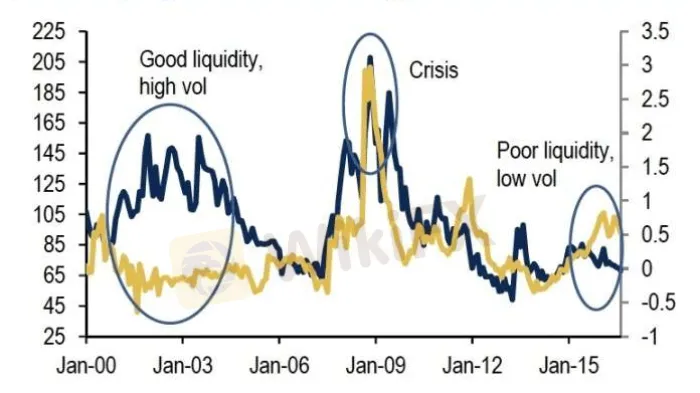简体中文
繁體中文
English
Pусский
日本語
ภาษาไทย
Tiếng Việt
Bahasa Indonesia
Español
हिन्दी
Filippiiniläinen
Français
Deutsch
Português
Türkçe
한국어
العربية
Which is More Profitable? Forex or Stock?
Abstract:The foreign exchange market has an endless number of major, minor, and exotic currency pairs to trade. Forex traders utilize pips to determine whether the market is moving up or down. EUR/USD, GBP/USD, and USD/JPY are prominent forex pairs.

The foreign exchange market is the world's biggest and most liquid financial market, with apparently an infinite number of major, minor, and exotic currency pairings to trade. Pips may be used by forex traders to watch price changes in order to assess whether the market is trending up or down. Among the most popular main currency pairings for forex trading are EUR/USD, GBP/USD, and USD/JPY.
Traders may bet on the value of blue-chip stocks and penny stocks, which are both popular assets with opposing initial valuations. Some of the most promising stocks to trade are those of well-known corporations with huge market capitalizations, such as Microsoft, Apple, and Amazon. If you are ready to take a chance on speculative investing, penny stocks may be profitable in the long run.
Market Trading Hours
The trading hours for forex and stocks differ. The currency market is active 24 hours a day, five days a week due to time zone overlap. Forex has this advantage over stocks. Stock-market trading hours differ depending on location and exchange.

The London Stock Exchange (LSE) is open from 8:30 a.m. to 3:30 p.m., and the core FX market overlaps the New York and Tokyo sessions. Asia-Pacific Exchanges are closed for lunch. Because forex trading hours are more flexible than stock market hours, traders have more time to invest. On weekends, these markets are closed.
Volume of assets
The quantity of cash assets is a big attraction. Forex trading is available on 330 currency pairs, including major, minor, and exotic pairings (see our forex trading website for more information). Forex traders consider major currencies such as EUR/USD and GBP/USD to be stable.
The stock market offers limitless opportunities, but it pales in comparison to the $5 billion in daily FX deals. Thousands of global shares in IT, medicine, and automobiles may be exchanged. This category includes both blue-chip and penny stocks. The Dow Jones Index and the S&P 500, two of the most prominent global indices, are traded on the stock exchange.

The number of shares on the stock market does not always provide an advantage over forex. Some traders prefer trading a small number of top currency pairings that have remained in the market over choosing between investing in existing, new, and emerging firms.
ETFs are a popular approach to trading stocks rather than currencies. Exchange-traded funds hold underlying assets and operate similarly to stocks. Spread bets and CFDs do not give the trader ownership of the underlying stock. ETFs are a useful offering since stock traders want long-term holdings.
On our instruments page, you may look through over 8,000 stocks and 1,000 ETFs.
Volatility and liquidity
Volatility is a typical forex vs. stock comparison topic. This measures market price changes, which may help traders earn money if the transaction goes well or lose money if it doesn't. Forex traders need high market liquidity in order to purchase and sell assets swiftly without impacting their prices. Short-term traders gain from high market volatility. Many forex strategies commence and exit deals fast in order to profit from minor price changes in volatile markets. As a result, they can make exact bargains.

Long-term traders who prefer buy-and-hold strategies may feel uneasy in volatile markets. Traders in stocks are impacted. Because blue-chip corporations are more stable, traders are more likely to make long-term investments. A volatile market would not work for their trading strategy since they do not desire short-term price swings. Trading in volatility.
Rates of margin
Consider leverage, or margin trading, when comparing the FX and stock markets. A minimum deposit of the whole transaction value is required for spread betting or CFD trading accounts. This allows traders to quadruple their profits while trading equities and forex. This has the potential to exacerbate losses.
Forex margin rates begin at 3.3%, with leverage of 20:1. The stock market's 20% margin rate or 5:1 leverage ratio lowers the danger of capital loss. If a dealer's transaction fails, this should lessen their losses. This increased leverage ratio may help forex traders with more experience in volatile markets and who close positions quickly. If you are successful, the payout will be well worth the risk.
Trading strategies
Forex traders have significantly more tools and strategies at their disposal than stock traders. Short-term Forex trading strategies include day trading, swing trading, and scalping. In the stock market, day trading and swing trading may be employed. Stocks are often traded in long-term positions, while currency pairings are more valuable to short-term traders in volatile markets. Due to the abundance of resources and tips, forex trading may have an advantage over stocks.
Is one more profitable than the other when it comes to forex and stocks?
There is no simple answer to which market is more profitable. Consider your personality, risk tolerance, and trading goals before selecting a financial instrument or market to trade.

FX is more profitable than stocks if you desire small, consistent profits from market changes. The forex market is more volatile than the stock market, where adept traders may profit quickly. Forex involves enormous leverage, and few traders focus on risk management, making it a riskier investment with potentially negative consequences.
If you want to purchase and keep for the long term, the stock market is a safer and more regulated option that may result in larger returns if the stock performs well. Trading stocks and forex demands different strategies and patience. If a stock is successful, the stock market is a safer and more regulated choice that may result in higher gains over time. You may earn money trading stocks and FX by using various tactics and exercising patience.
Stay tuned for more Forex Educational articles.
Download the WikiFX App from the App Store or Google Play Store.

Disclaimer:
The views in this article only represent the author's personal views, and do not constitute investment advice on this platform. This platform does not guarantee the accuracy, completeness and timeliness of the information in the article, and will not be liable for any loss caused by the use of or reliance on the information in the article.
Read more

Top Benefits of Forex Cards
Forex cards enable you to make seamless transactions in foreign currencies when travelling abroad. Check out this guide to learn the benefits of forex cards in detail.

Mule Accounts: The Secret Weapon Fake Forex Brokers Use to Dupe Investors
Explore this story where we have highlighted how fake forex brokers use mule accounts to dupe investors.

Fraud Brokers List for July 2025- EXPOSED
Attention investors and traders! If you want to invest in the forex market, be careful not to choose these scam brokers. This warning list is issued by the Financial Conduct Authority.

Know the Major Risks of UbitMarkets, Before You Invest!
Scam brokers involved in the forex market who act genuine in the beginning but turn out to be frauds in the end. Choosing UbitMarkets could lead you to serious losses. Check out this article to know why we’re saying this.
WikiFX Broker
Latest News
FCA clarifies expectations on bullying, harassment and violence to deepen trust in financial service
Asia-Pacific markets mixed after Trump shifts goalposts on tariffs again
XS.com Expands Global Reach with Landmark Kuwait Launch
European markets set to open mixed amid fresh U.S. tariff threats
Top Wall Street analysts are pounding the table on these 3 stocks
Stock futures fall after Trump team says tariffs will go into effect on Aug. 1: Live updates
10 Unlicensed Brokers Exposed – Check Now to Stay Safe!
S&P 500 futures fall slightly as Trump threatens new tariffs, Tesla shares drop: Live updates
Stocks are lower despite Bessent saying several trade announcements are ahead: Live updates
Exposed: Ibell Markets - A Scam Broker That Does Not Allow Withdrawals
Currency Calculator


